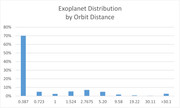When we look at other planetary systems we see worlds that are very long distance orbits from the host star.
Why not same thing here?
We could have 9th 10th 11th etc but the orbits are very distant.
Easy to see how we might have the 9th planet way out and we might never detect it unless we got very lucky and it crosses something we are looking at.
Keep an open mind is my thought
Why not same thing here?
We could have 9th 10th 11th etc but the orbits are very distant.
Easy to see how we might have the 9th planet way out and we might never detect it unless we got very lucky and it crosses something we are looking at.
Keep an open mind is my thought



